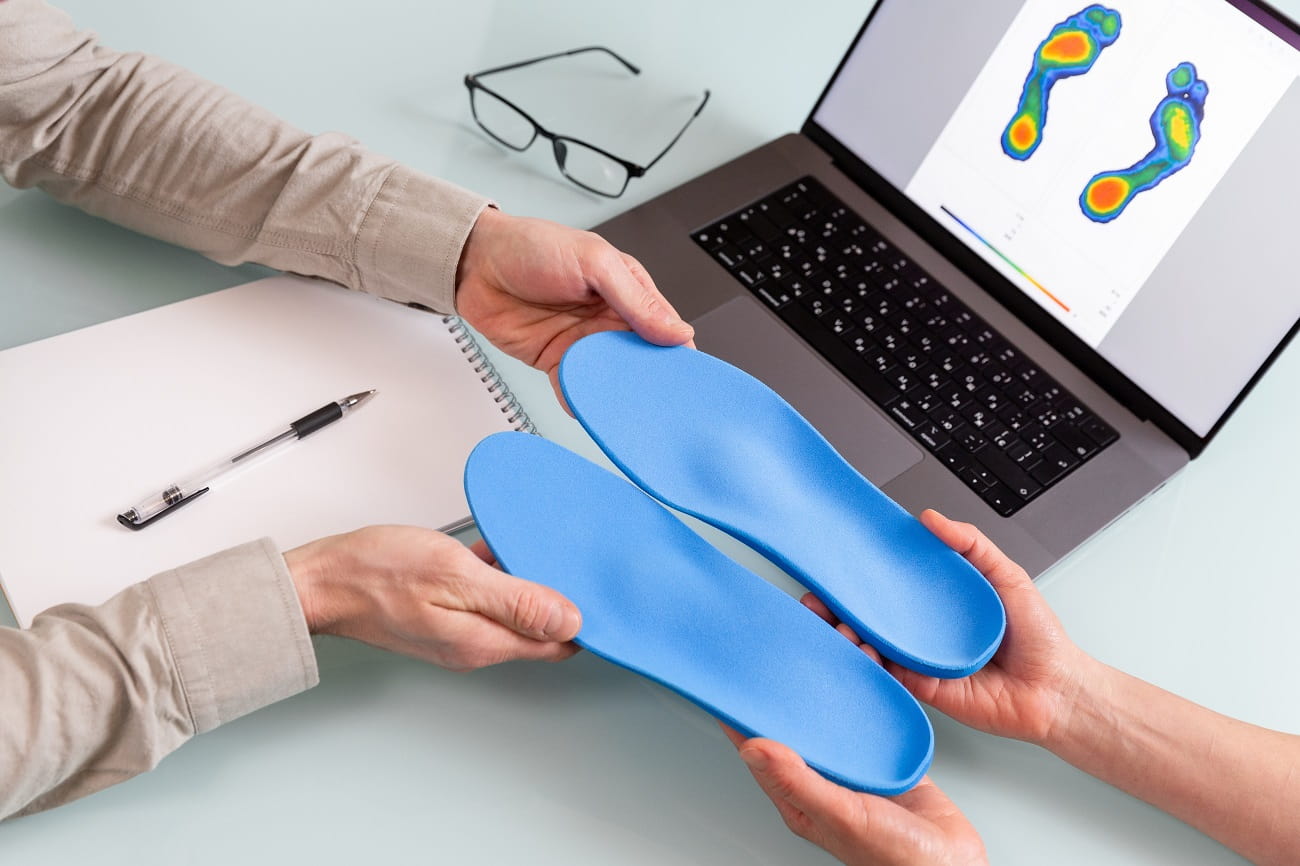If you are experiencing orthopedic issues such as foot pain, osteoarthritis, spinal injury, back pain, or other orthopedic conditions, orthotic devices may be beneficial in providing relief and support.
Your doctor may recommend a custom-made orthotic or pre-made device to help with your condition. Understanding how an orthotic will help and whether your health insurance benefits will cover the costs is essential.
We provide custom orthotics in Albuquerque & Las Cruces, and often get asked: "Are custom orthotics covered by insurance?" It depends on the circumstance. Here's everything you need to know about healthcare insurance plans and orthotics.
How Orthotic Devices Can Assist You

Many assume orthotics are shoe inserts, yet they cover a broader spectrum of devices that support good posture and reduce pain.
According to the dictionary, "Orthotics is the medical field concerned with the application and manufacture of devices which support or correct the function of a limb or torso".
Therefore, orthotic devices are rigid or semi-rigid devices used to support, align, prevent, or correct deformities, protect a body's function, or assist dysfunctional joints. In this light, a shoe insert is just one example; other custom orthotics covered by insurance include:
- Foot orthoses;
- Ankle-foot orthoses;
- Knee-ankle-foot orthoses;
- Spinal orthoses;
- Elbow orthoses;
- Wrist orthoses.
Orthotic devices have been around since ancient times, with the earliest known orthotic devices made from simple materials such as leather, wood, and metal. Today, orthotics are part of medical care.
Technological advancements have allowed for more precise and individualized orthotic devices. In addition, orthotics can treat a wide range of conditions, from sports injuries to neurological disorders.
Affording Orthotics with Insurance Coverage

Wondering how to get orthotics covered by insurance? Do your research. Naturally, insurance coverage alleviates the financial burden of acquiring orthotics, which may be expensive. Coverage typically varies by provider, although most will cover medically necessary orthotics, such as those needed to treat injuries or deformities.
Depending on your insurance plan, coverage may also include the cost of fitting, labor, and device replacement. Knowing the scope of coverage offered by different insurance providers helps you make informed healthcare decisions.
Employer-Sponsored Orthotics
We recommend researching employer-sponsored coverage for durable medical equipment, especially if you've recently switched jobs or are about to enter the open enrollment period for your current healthcare plan.
It is important to understand the details of your employer’s healthcare benefits, including any deductibles or co-pays, as well as any exclusions or limitations. You'll want to ensure the plan meets your needs and is within your budget.
In terms of orthotics, durable medical equipment (DME) is the section that covers insoles and other orthotics, even though your plan may not explicitly mention the types of orthotics by name. Your healthcare insurance plan may include copayments or coinsurance charges for prescribed orthotics.
Marketplace or Off-Marketplace Policies and Orthotics

Marketplace healthcare policies, or off-marketplace policies, are not sold through a marketplace, such as an insurance company's website or a broker's office. Instead, they are sold directly to consumers through a direct-to-consumer approach or an agent or broker.
They can be an excellent option for those who want to purchase orthotics but cannot afford the high cost of buying them through a traditional market. Patients benefit from marketplace policies that offer discounted orthotics prices, free shipping, a satisfaction guarantee, and a wide selection of health-related products.
The downside to marketplace policies is that they may provide more limited orthotic coverage, higher out-of-pocket costs, and exclude certain orthotic products or services. If a consumer needs a specific type of orthotic, they may be unable to find it through a marketplace policy.
Medicaid and Orthotics
Does Medicaid cover orthotics? Yes, however, New Mexico only offers Medicaid coverage for orthotics to those who qualify. The coverage includes the purchase and fitting of orthotics and the cost of related services such as physical therapy and doctor visits.
Medicaid will also cover the cost of any necessary repairs or replacements. To qualify for coverage, patients must demonstrate a medical necessity for the orthotics and have a doctor's prescription. Coverage may vary depending on the patient's health needs, so it is vital to contact Medicaid to ensure the necessary coverage is available.
FSA and HSA for Orthotics
Are orthotics covered by FSA and HSA? Yes. Flexible Spending Accounts (FSA) and Health Savings Accounts (HSA) are tax-advantaged accounts that allow you to set aside money for medical expenses, including orthotics.
To use your health savings account for orthotics, you must purchase them from an approved medical supply company approved by your FSA or HSA plan. The company will provide you with a receipt for the purchase, which you can then submit to your FSA or HSA plan for reimbursement.
Your FSA or HSA plan will then reimburse you for the orthotics cost up to the amount you have set aside in your account.
Medicare and Orthotics
If your healthcare provider deems it medically necessary, Medicare Part B will pay for 80% of the approved cost of custom-made or pre-made orthotic devices.
This is because Medicare classifies orthotics as durable medical equipment (DME). DME is the equipment used in the home for medical reasons, with a life expectancy of more than 3 years, and which is only useful to those who are sick or injured.
Does Medicare cover orthotic inserts? Yes, it does.
Medicare lists the following devices as orthotics under the heading of DME:
- Ankle, foot, knee, back, neck, spine, hand, wrist, and elbow braces;
- Orthopedic shoes as a necessary part of a leg brace;
- Prosthetic devices like artificial limbs.
Medicare recipients must meet all the following prerequisites for eligibility:
- The orthotic must be medically necessary and prescribed;
- The orthotic supplier must be enrolled in Medicare and accept;
- Medicare assignments.
Individuals enrolled in Medicare Part B who require an orthotic device will have to pay 20% of the Medicare-approved cost plus the standard Part B deductible. The cost of the orthotic varies depending on the type of device, the location, and whether it is prefabricated or custom-made.
For the best deal, consult your healthcare provider and use a Medicare-participating supplier that accepts custom orthotic assignments.
Below are a few FAQs related to Medicare and orthotics:
Does Medicare Cover Orthotics for Plantar Fasciitis?

Plantar fasciitis, referred to as "Policeman's Heel," is a condition characterized by inflammation of the tissue on the bottom of the foot. A stabbing pain near the heel is a common symptom. Physical therapy, shoe inserts, steroid injections, and surgery are all available treatments for this ailment.
Medicare Part B may cover some orthotics for plantar fasciitis, depending on your individual circumstances. To be considered for coverage, you must first get a prescription from your doctor and have the orthotics custom-fitted by a qualified provider. You may also be required to submit documentation of medical necessity.
Does Medicare Cover Recommended Orthotics for Weight Loss?
No, Medicare insurance does not pay for orthotics coverage recommended for weight loss. Orthotics are devices used to treat medical conditions and are not considered preventive measures.
Does Medicare Cover Orthotics After Hip Replacement Surgery?
Medicare does not generally cover the cost of custom orthotics after hip replacement surgery, as they are considered an optional or non-medically necessary expense. Medicare may cover some of the cost of orthotics if prescribed by a physician as part of a treatment plan, but this is only in very specific circumstances.
Does Medicare Cover Transportation for Orthotics Appointments?

Medicare may pay for non-emergency medical transportation in an ambulance if you have a doctor's note to support the medical necessity. Otherwise, certain Medicare Advantage plans provide coverage for non-emergency medical transportation, such as trips to the doctor, hospital, and pharmacy. For more information about related supplemental benefits, contact your insurance agent.
Does Medicare Cover Orthotics for Shoes?
Yes, Medicare Part B (Medical Insurance) covers custom-made orthopedic shoes, inserts, and shoe modifications ordered by your doctor, as well as fitting and follow-up services if foot orthotics are medically necessary. To be eligible for coverage, the treatment must be ordered by a doctor or other health care provider and provided in an approved facility.
Figuring Out If Your Insurance Plan Covers Orthotics
Does your insurance pay for orthotics? To find out if your health insurance covers orthotics, the quickest and easiest way is to check the Summary of Benefits and Coverage (SBC) you may have in your home. If you need help, you can call, email, or search online for a copy from your insurance company. The SBC may not tell you everything you need to know.
Still, it should provide you with basic coverage details, such as deductibles, copays, and out-of-pocket costs. It may even mention durable goods or medical equipment, but this may only provide you with the copay or coinsurance percentage. To know for sure whether orthotic devices are included, contact your insurer.
How to Guarantee Insurance Reimbursement for Orthotics

Firstly, you must have a health insurance plan that will cover custom orthotics.
The following steps are a part of this process:
- Start by researching different insurance policies and what they cover. Look for one that provides coverage for custom orthotics and determine how many orthotics it covers annually.
- To choose the best insurance provider, consider factors such as premiums, claims verification, and other relevant details.
- To be eligible for coverage of certain medical expenses, you must be underwritten to determine your baselines. If your provider is unsatisfied with your baselines, they may provide you with a revised quote with a higher premium amount.
- Healthcare plans typically use a combination of factors to determine an individual's baseline. These factors may include age, gender, medical history, lifestyle, and other risk factors.
- Finally, select your beneficiaries (if necessary) and begin making payments according to the terms of your contract.
Please note: Most custom orthotics insurance plans require you to meet a deductible before you can claim for healthcare expenses. The time it takes to meet the deductible varies from plan to plan.
Also, Medicaid and Medicare are two distinct programs, even though individuals may be eligible for both. Medicaid is a joint state and federal program that provides health insurance to those with a low income, while Medicare is a federal program that provides coverage to those who are 65 or older or have a severe disability, regardless of their income level.
PrimeCare is Here for All Your Orthotic Needs
It's a good idea to contact your insurance provider to determine the type of coverage you are eligible for regarding the cost of orthotics, which many insurance plans cover when medically necessary. In any event, most of the time, orthotics are worn due to necessity.
At PrimeCare, we understand the importance of proper orthotic fit and use the latest technologies to ensure your satisfaction. Our health professionals in Albuquerque and Las Cruces work hard to offer the best customer service and are always eager to help you understand what your health insurance plan covers. Contact us today to learn more about how orthotics can help you.

.svg)
.svg)









